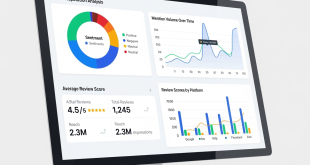We live in the age of the short attention span. It’s safe to assume that anyone reading your webpage has got a few outstanding e-mails to get around to, Facebook notifications to check, and a Smartphone buzzing on their desk. These days, having an exceptional product or service isn’t enough to get noticed. When everything is designed to be as flashy and as captivating as possible, marketers need to know how to compete. So in this overwhelming age of information, how can you make your website stand out?
The answer might seem too simple to be true: quality writing. The most important way to prove the worthiness of your company is with a well written website. While everyone else is focused on advertising with flashy pop-ups, colourful banners, and BUY NOW buttons, your first priority should be making your point in a clear, interesting, and captivating way.
Don’t get me wrong, flashiness can work. In fact, in many situations flashiness can be crucial to the impression of the website. But what’s the point of grabbing viewers’ attention if they’re not going to stick around to read what you’ve got to say?
By applying these three writing tips, you can drastically improve your website writing, and significantly improve the impression your website makes on your readers.
Expand Your Adjective Vocabulary
You can use your word choice to communicate a lot. Many times website writers aim for quantity rather than quality, which is why so many websites are dry and unimaginative.
While it’s important to use words that your audience will understand without having to look up in the dictionary, it’s just as important not to bore them with the overused words of tired writing. One of the major vocabulary mistakes website writers make is the use of boring adjectives. Most business websites need to use many positive adjectives to describe their product or services in an accurate and promotional way. While words such as “good and great” might convey the right sentiment, they don’t convey it to the extent most writers aim for. The best thing to do when you are try to replace the word “good” is to find a word which carries a more specific meaning, particular to what you are describing. For example, instead of describing your customer services as “great”, you could use words such as “friendly, efficient, or extensive.” If you get stuck reusing the same vague adjectives, online thesauruses are usually the best places to turn.
To get you started, here are some examples of other positive, professional adjectives to use in place of good or great:
- excellent
- fantastic
- wonderful
- effective
- reliable
- compelling
- powerful
- brilliant
- clever
- renowned
- reputable
- proficient
Overuse of Words
Something else to watch out for in vocabulary is the overuse of certain words. If you find you’ve repeated any word more than 3 times in one paragraph, you should seriously consider finding a synonym to replace a couple of its mentions. For example, in a description of your business you may find yourself repeating the word “custom” too often. Synonyms such as “unique, adaptable, made-to-order, or personal” are adequate replacements. Again, online thesauruses are wonderful tools in this pursuit.
Business Specific Vocabulary
As a business owner, you’re an expert in your field. Most businesses have specific jargon words that outsiders might not completely understand. Instead of watering down your website, or struggling to find appropriate replacements, a high quality website will define these terms for their users. Assume that your readers are intelligent enough to learn and understand the definition; they will feel flattered, and well informed.
There are a number of ways to add definitions to your website. You could define the jargon word in parenthesis after it is used for the first time. You could explain the terms in the introduction to your site. You could create a glossary page and link to it every time a dense word is used. Or you could even insert a word bank in a neat text box off to the side of the main text. There are many options to improve the readability and accessibility of your site; use what works for you!
By setting your vocabulary at a superior level, you will be setting the reputation of your business at a higher level as well. Improving your the vocabulary of a webpage is easy and effective. Assume that your reader can handle a stimulating webpage, and you’ll find your reputation improves astronomically.
REM Web Solutions is a web design and development site, located in the Waterloo Kitchener area. We work closely with our clients to create high functioning, beautiful custom sites. Does your website need some tweaking? We offer a free demo of our own design software. Please feel free to contact us for more information, and take control of your website today!
 Entrepreneur Resources Your source for small business information
Entrepreneur Resources Your source for small business information





One comment
Pingback: All About Malaysian Women Entrepreneurs :: Sell Your Business Tips